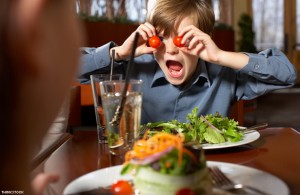 “May I take your order?” She said, in that annoyingly polite tone that begged for a quick and succinct answer. That was your cue. Your leisurely perusal of the menu was indeed complete. It isn’t your fault that you took so long. You could hardly hear yourself think. It should have been date night for the red faced couple sitting across from you, but grandma cancelled again. It was obvious that they had given up. One child was challenging the other in a carrot throwing three point contest. The other was barely visible, his head peeked out from the top of the high chair. Both disgusted and sympathetic he cringed and the slightly worn parents shrugged. “Kids will be kids!”
“May I take your order?” She said, in that annoyingly polite tone that begged for a quick and succinct answer. That was your cue. Your leisurely perusal of the menu was indeed complete. It isn’t your fault that you took so long. You could hardly hear yourself think. It should have been date night for the red faced couple sitting across from you, but grandma cancelled again. It was obvious that they had given up. One child was challenging the other in a carrot throwing three point contest. The other was barely visible, his head peeked out from the top of the high chair. Both disgusted and sympathetic he cringed and the slightly worn parents shrugged. “Kids will be kids!”
Kids will be kids?!
Haven’t we all heard or said this before. It is a fairly innocuous statement. When we say we want kids to be kids, we are acknowledging the care free years that should accompany youth. We say this, because we are protecting them from the rigors, structure and accountability that makes our 18th birthday so frightful. We want our kids to stay kids, because we want to delay their inevitable date with misery. We want to prolong the time it takes for them to become us. Our efforts to save them are valiant, but they may be shortsighted.
Growing up in a loving and happy environment is essential for a well-adjusted future contributor to our society. But, that is where we confuse things. Many of us exchange happiness for recklessness. We let our kids be kids, because privately we want to rip the shackles of structure from our own lives. We would rather let them be free than live the confined, constrained and controlled life of adulthood.
The emotional tether to our beloved kids may be exactly what hinders them. Kids of today aren’t profoundly different than the kids of yesterday. It is the parents of today that are profoundly different than the parents of yesterday. The indifference of the millennials and the fatalism of the “you only live once” generation are not a product of the new millennium. That generation’s idiosyncrasies are a product of their parents. Instead of structure, accountability and rigor, they were allowed to be kids.
Kids need opportunities to let their hair down. They need to explore and imagine and make believe they are super heroes. However, they also need structure. They need us to set the rules. It is incumbent upon us to create an environment that allows them to understand the world that they have to grow up in. Kids will be kids, but kids will also be adults!
Slightly different,
doc mu
